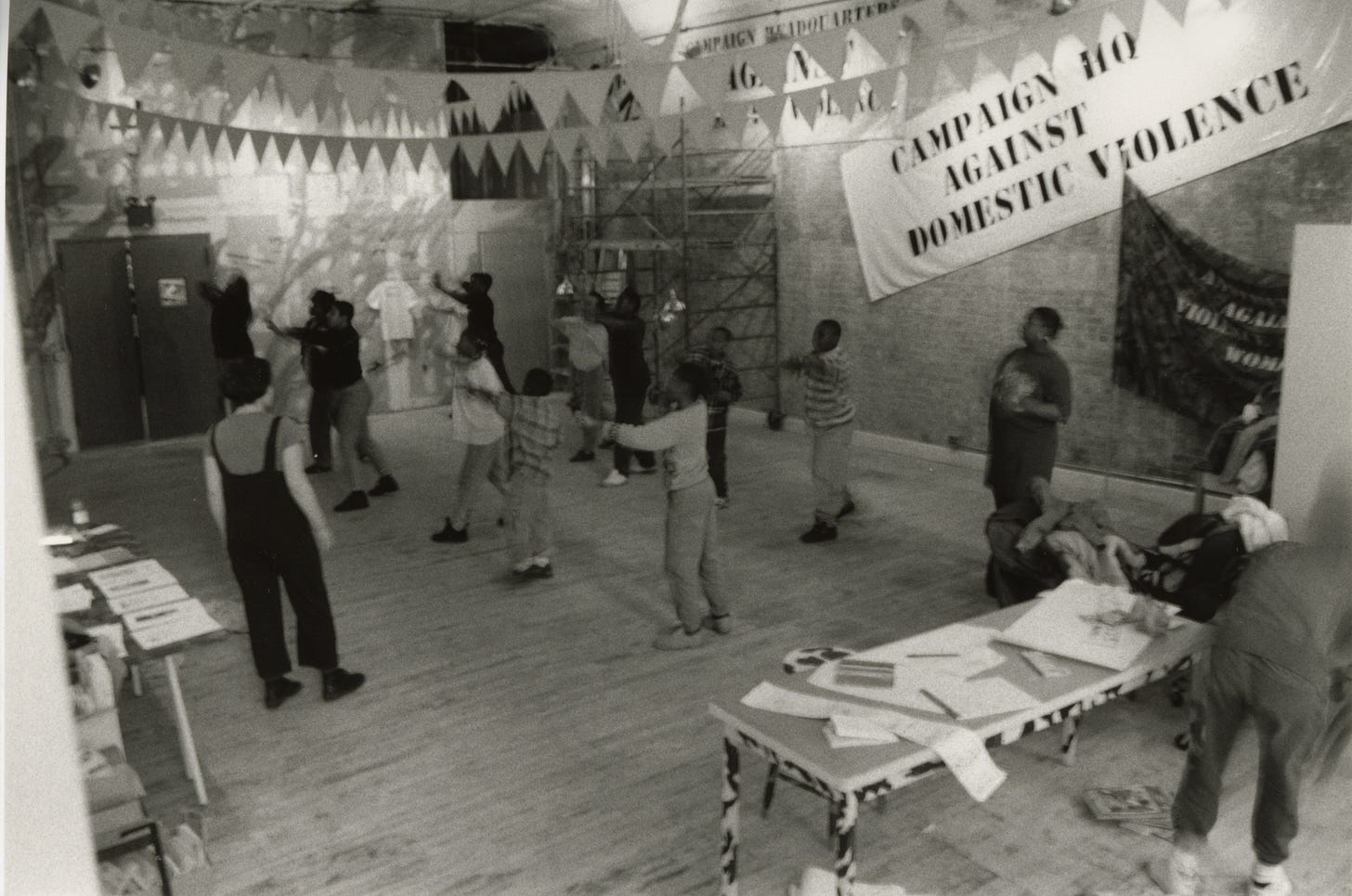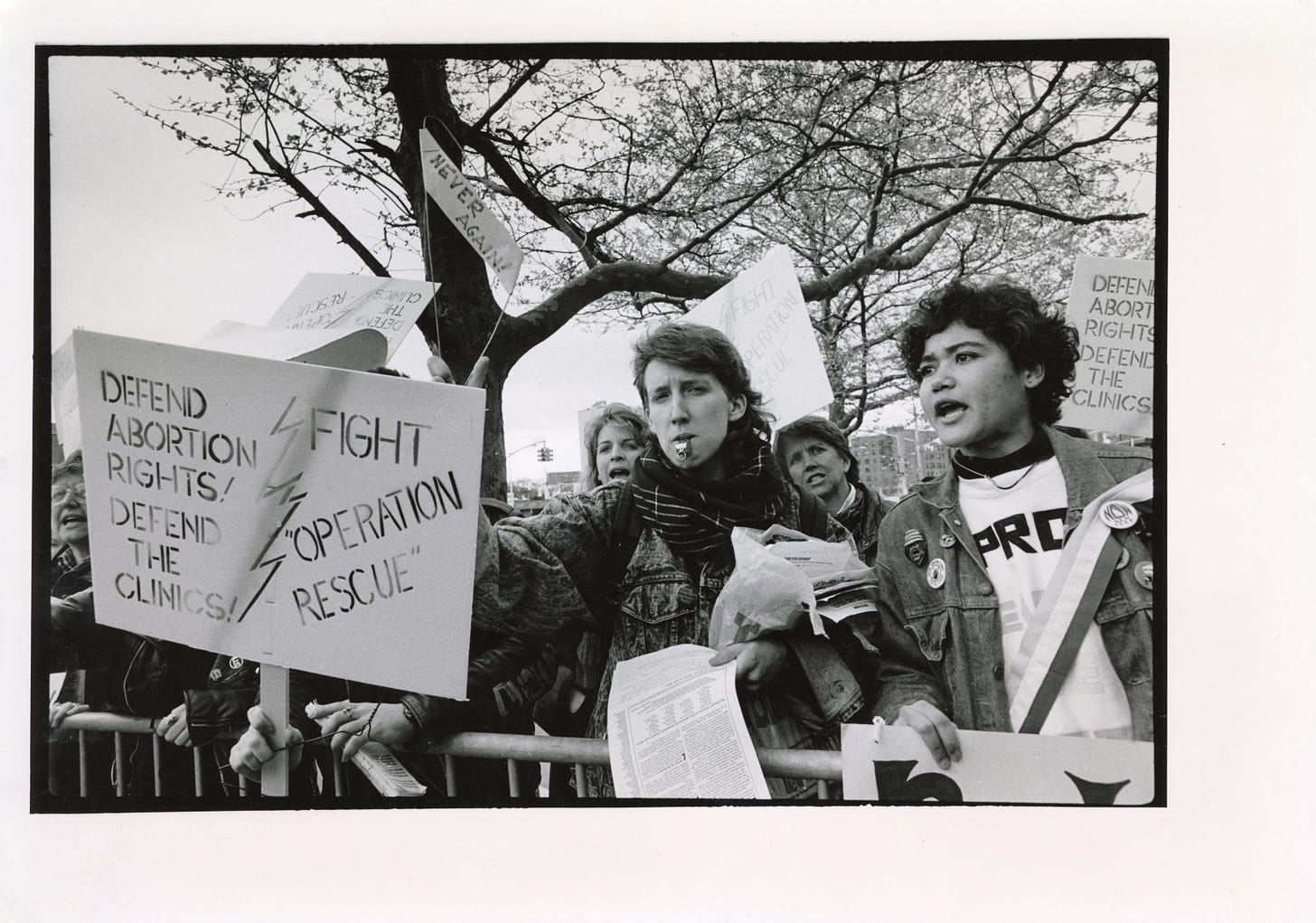TFI Digital Archive: Women's History Month Weekly Selections
Learn about Combat Zone: Campaign HQ Against Domestic Violence, Café Tabac, 1980s Pro-Choice Demonstrations, and the 1976 "An Alternate View of Women's Imagery: The Artist as an Individual" panel.
Welcome back to TFI Ministacks! To wrap up our weekly Women’s History Month selections from the TFI Digital Archive, we’ve included a few extra gems. While Women’s History Month may only be celebrated in March, TFI is committed to preserving and safeguarding feminist history and culture year-round.
TFI is dedicated to preserving and making feminist history accessible to all. Click the button below to support our work and ensure future generations can learn from the powerful feminists who came before us.
TFI Digital Archive: Women’s History Month Weekly Selections
Combat Zone: Campaign HQ Against Domestic Violence
Mary Beth Edelson, Combat Zone: Campaign HQ Against Domestic Violence, 1994.
Copyright held by the Estate of Mary Beth Edelson; preserved through a partnership with The Feminist Institute. Image courtesy of the Estate of Mary Beth Edelson and Accola Griefen Fine Art.
See record.
Combat Zone: Campaign HQ Against Domestic Violence (1994) was a participatory art project by Mary Beth Edelson, housed at Creative Time. Created in response to the “war zone” that abused women endure, the installation was designed to inspire action. It offered counseling, self-defense workshops, lectures, a hotline, and media resources, making it both an artistic and activist space.
Edelson, known for integrating performance and activism into her work, naturally extended these elements into Combat Zone, which challenged the viewer to confront domestic abuse rather than passively observe. This blend of artistic practice and feminist activism was also evident in her Story Gathering Boxes project, which collected and shared women’s personal narratives.
Polaroid from No Day Like Sunday at Café Tabac
Addresses Project, Polaroid from No Day Like Sunday at Café Tabac, 1990s.
Copyright held by Addresses Project. Ingested into the TFI Digital Archive through a partnership between The Feminist Institute and Addresses Project, 2022. Image courtesy of Wanda Acosta.
See record.
This ephemera, digitized and collected by Gwen Shockey, is from the Addresses Project which is an organization that investigates lesbian and queer space and memory in New York City from the early 1900s to the present day. This scan in particular is a Polaroid taken at a lesbian party thrown by Wanda Acosta and Sharee Nash called “No Day Like Sunday.” Acosta, a nightlife icon, creator of parties like Indulgence at Casa La Femme, Pleasure at Bar d’O, Kitty Glitter at Liquids, and so many more, owned many lesbian bars that pushed lesbian culture into “visible and glamorous” spaces. It allowed queer women to see each other and themselves with “respect and adoration.” By creating a queer and lesbian multidisciplinary platform through intergenerational community building and place-based heritage, Gwen Shockey uses the memory and portraiture components to document and archive lesbain and queer moments in NYC’s history.
Selection and description by Spring 2025 CUNY Cultural Intern, Journey Ford.
Pro-Choice Demonstration
Donna Binder, Pro-Choice Demonstration, 1988.
Copyright held by Donna Binder; digitized during The Feminist Institute’s pop-up Memory Lab, 2023.
See record.
This photo captures a pro-choice rally countering Operation Rescue, an anti-abortion group founded in 1986 that had blocked the entrance to a women’s health clinic in Queens, New York. Feminist activists, clinic defenders, and reproductive rights groups such as the National Organization for Women (NOW) and Women’s Health Action and Mobilization (WHAM!) rallied in large numbers to fiercely defend reproductive rights. This action was part of a national resistance against Operation Rescue, contributing to the passage of the Freedom of Access to Clinic Entrances (FACE) Act in 1994, which made it illegal to block clinic access. This photo was taken by Donna Binder, a photojournalist and entrepreneur with over 25 years of experience in creating, distributing, and fundraising for social justice and cultural projects.
"An Alternate View of Women's Imagery: The Artist as an Individual" Panel Cassette
Phyillis Krim, "An Alternate View of Women's Imagery: The Artist as an Individual," cassette, 1976.
Copyright held by and image courtesy of the Estate of Phyllis Krim. Ingested into the TFI Digital Archive through a partnership between The Feminist Institute and the Estate of Phyllis Krim, 2024.
See record.
Part of the Estate of Phyilis Krim includes a cassette holding the recording of “An Alternate View of Women’s Imagery: The Artist as an Individual” of a panel discussion Krim organized. Phyllis Krim was best known for her allegorical paintings of classic cars symbolizing power, beauty, and strength during the 60s and 70s. During the screening of her documentary, “Driving Passion (1975),” and her solar exhibition, “Classic Cars and Other Machines(1976),” this discussion was moderated and held at NYU’s Loeb Student Center(1976) by Louise Bourgeois, with speakers including Phyllis Krim, Bruce Barton, Ernest Briggs, Corinne Robins, and Deborah Remington.
Her works being prized, as well as being broadcasted on Manhattan Cable Television, Krim opened a space for her signature artistic style and was the first and only woman invited to be a charter member of the Automotive Fine Arts Society in 1986 for her creative outlook of the beauty in mechanical objects.








